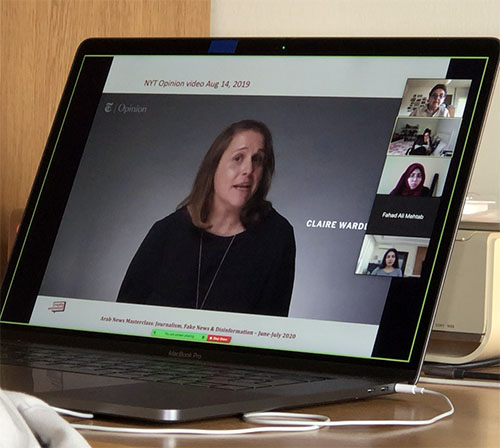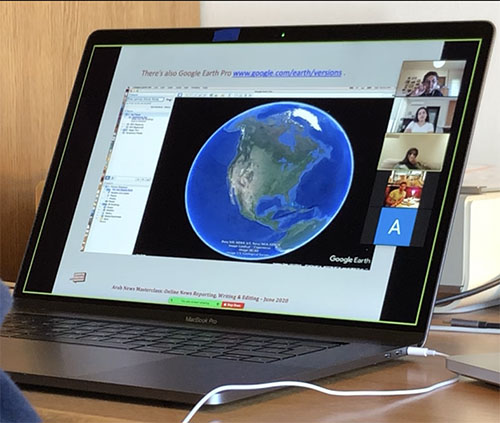Media Unlimited director Magda Abu-Fadil advised three groups of journalists to be on their guard against “information disorder” that misleads audiences by disseminating dis-, mis- and mal-information.

Arab News masterclass in Journalism, Fake News and Disinformation
She kicked off a virtual masterclass with a doctored video tweeted by U.S. President Donald Trump purporting to show an African-American toddler escaping from a white toddler, claiming the former was being chased by a racist child.
The video’s producer used a phony logo of CNN, a favorite Trump target, to falsely claim the network is a purveyor of “fake news.”
The clip is in fact of two little pals who had just hugged and were running together and whose parents cherish their friendship. Trump even misspelled the word toddler.

Doctored video tweeted by Donald Trump
Abu-Fadil’s advice was part of training in late June and early July 2020 for reporters and editors located in Saudi Arabia, Dubai, Pakistan and India working remotely for the Saudi daily Arab News.
She demonstrated how manipulated information was part of historical events but that its weaponization in the 21st century had taken it to new heights, amplified by social media, hence the need for professional standards of ethical and accountable journalism.
Abu-Fadil also spoke of plagiarism and fabrication as forms of deception, provided tips on media manipulation, discussed the role of influencers in distorting news, and pointed out how easily bots can spread false information.
She urged the journalists not to use the term “fake news” which is misused by politicians and detractors to attack all those with whom they disagree.

Definitions of “information disorder”
Abu-Fadil provided examples of dis-, mis- and malinformation, satire, parody, false connection, misleading content, false context, imposter content and fabricated content.
She presented a list of steps to verify user-generated content and stressed the importance of media and information literacy to help the trainees think critically about the information they consume and create.
A portion of the training focused on verification of information before and after reports are published with reference to the International Fact-Checking Network (IFCN) that developed a code of principles to guide fact-checkers in their work.

The weaponization of information in the 21st century
Abu-Fadil zeroed in on social media verification, with special attention paid to photo and video manipulation.
She presented several case studies and equipped her charges with tools to detect doctored photos through reverse image searches, to analyze Facebook and Twitter accounts, to learn about geolocation, weather corroboration, shadow analysis and image forensics.
The MU director discussed “deepfakes” and showed a video on how troublemakers combine images of people from different sources to make them appear like they’re saying and doing things they did not.

Media expert Claire Wardle explains “deepfakes”
Abu-Fadil wrapped up the masterclass with a note on combating online abuse as journalists, particularly women, are increasingly being subjected to disinformation campaigns that undermine their safety and that of their sources.
The training was based primarily on the “Journalism, Fake News and Disinformation” handbook Abu-Fadil co-authored for UNESCO.






